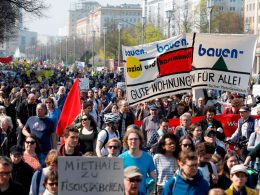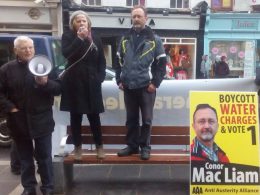An IPSOS/MRBI poll published in June in the Irish Tines showed Labour as themost popular party in the state with 32% support. This had never happened before in the history of elections or opinion polling in this state.
This poll was merely the most dramatic of a series of polls showing a big increase in support for Labour since the 2007 General Election. This rise in support is particularly strong in Dublin here polls are consistently showing Labour with more than 30% support.
These poll results have provoked speculation that Labour could emerge as the dominant partner in a coalition with Fine Gael after the next election or, more likely, that Labour could come a relatively close second to Fine Gael and wield more influence in government than was the case in previous coalitions. The key factor in this increase in support for Labour is, of course, the economic crisis. This crisis has begun to reveal the true face of the traditional rightwing parties.
Fianna Fail in Government have organised a massive bank bailout, carried through savage cutbacks and preside over unprecedented levels of unemployment. Their support has been decimated with some polls showing their support below 20%.ine Gael, being in opposition, have not been exposed to nearly the same extent. However, their support levels are poor given the implosion of Fianna Fail support.
This can only be partly explained by the unconvincing and wooden leadership of Enda Kenny. More fundamentally, it is down to the fact that their policies are seen to be very similar to those of Fianna Fail and, in some respects, even more right-wing and anti-working class.
In these circumstances, Labour seem to many people to be different with their opposition to the bank guarantee, the bailout of Anglo and their insistence that the pain be “shared more fairly”. In this sense, the increased support for Labour reflects a growing rejection of right-wing policies and the search for an alternative. However, a serious examination of the politics of the Labour Party shows that Labour do not represent a real alternative.
For starters, Labour support policies aimed at making working people pay for a crisis that is not of our making. In the run-up to the last Budget, Labour supported cutting the public sector pay bill by €1.3 billion. They also supported a carbon levy aimed at raising €500 million. Eamonn Gilmore boasted at the time that Labour had an alternative budget programme not of €4 billion in cuts but €6 billion!
Labour leader Eamonn Gilmore was severely criticised by the millionaire press during the Croke Park ballot for not speaking out in support of the deal. However, Gilmore does support the deal which means 20,000 job losses and a five year pay freeze. When the result was announced he said: I
welcome the outcome of the ballot and I welcome the fact that it has been agreed and it is an agreement that if Labour is in government we will honour and will respect.”
Next up, look at who Labour are planning on going into Government with – Fine Gael. Fine Gael in government will block any policy aimed at seriously improving the living standards of working class people at the expense of big business and the rich. Why choose as your coalition partners a rightwing party with such a stance if you have any intention whatsoever of fundamental change in the interests of working people?
It is also worth taking a look at some of the people Labour are recruiting these days. In recent months a number of career politicians have joined the Labour Party. These include independent councillors in Roscommon and Donegal, a Sinn Fein councillor in Dublin and a former independent TD for Mayo-East Jerry Cowley. None of these people have a background or track record in left-wing politics.
However, the most interesting of the new Labour recruits is Mae Sexton from Longford/ Westmeath who joined the Progressive Democrats in 1997 when they made mass public sector sackings and attacks on single parents the centrepiece of their election programme and served as a PD TD from
2002 to 2007. If Labour are recruiting star candidates like Sexton it says a lot about Labour and the kind of policies they will be backing in the next Government.
A Fine Gael/Labour Government will be a capitalist government that will make working class people pay for the economic crisis. Labour will, no doubt, extract some concessions on secondary issues, in return for ditching their radical image. However, as the radical image fades a new space will open up for genuine left-wing politics in Irish society. The Socialist Party is building now in preparation for using that opportunity to the maximum.












